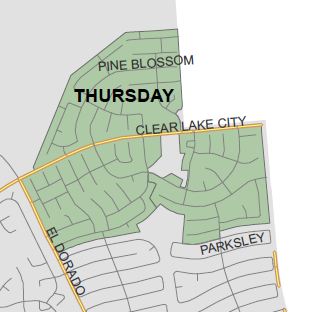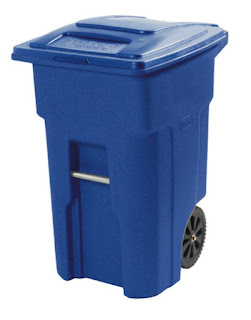Last night, City Council held its
first of two public meetings to receive input on the new trash contract that City Council approved by a narrow margin (4 to 3) during
the October 23 meeting.
The meeting was intended as a forum for the airing of views regarding cost allocations between commercial and residential customers, as the new contract incorporates substantial increases that must be absorbed by
someone.
But those views were
not primarily what got heard last night. What happened instead is that a clearer picture began to emerge regarding the
very basis of the contract, which may have been flawed in more ways than I first realized.
I have argued (and argued) that the contract is over-scoped: it provides a greater intensity of service than is invoked by the needs of our collective residential and commercial situations.
Increasingly it appears, however, that the contract might also be over-funded: the unit bases for the bidding may not reflect the reality of what actually exists. This possibility became increasingly apparent as Ameriwaste representatives argued at length that,
when viewed in real terms, they were
not exactly guilty of proposing the bid increase of which they have been accused (to the point of losing the contract to another vendor).
If you've never sat in on a City Council meeting before, I
highly, highly recommend that you do it at least once (or watch at least one segment of
the City's video feed, which is perhaps more convenient).
IF you do that, you will never again find yourself in a position of staring at a polling station screen and scratching your head in confusion over which candidates to vote for. I sat there last night in that meeting marveling at the sheer diversity of personality and public service priorities exhibited by the individual members of that Council. It's hard to believe that such a large range in basic perceptual skills and ideology could be found
within a single biological species, let alone a single City Council.
:-)
On one hand last night, there was
Phalen and
Mann, whose sole focus was propriety - specifically, whether or not the contract had been executed in accordance with laws governing municipal contracting.
On the other hand, there was
Becker and
OKeeffe, whose sole focus was whether or not the contract represented a good value for the taxpayer, and who were summarily
unimpressed by whatever degree of T-crossing and I-dotting might have been achieved during the mechanical execution of it.
This wasn't stated explicitly, but I got the feeling that the whole thing boiled down to an argument between
relative value and
absolute value. The four members of Council who voted FOR the new contract with Republic Waste two weeks ago were primarily concerned with how the numbers stacked up
relative to what other local cities were paying for similar services. And from that limited perspective, the contract looks pretty good, which I suspect is why they pushed so hard to approve it quickly and without further debate (and I don't mean to pin the blame for that on Phalen and Mann alone -
Dawson and
Lee appear to also have been characterized by that kind of thinking). Their bottom line was that the lowest bidder was selected through a legal process. That being the proven case,
who cares about the rest? Let's not sweat the small stuff, because League City has bigger fish to fry (Mann was particularly strident on this point last night).
I'll tell you who cares about the rest:
Any true fiscal conservative. The issue of
absolute value should
not be dismissed out of hand without scrutiny, because it does not matter how "legal" a given contract is if the contract doesn't represent the best interest of the taxpayers to start with. And "small stuff" in this case could amount to anywhere between a few hundred thousand dollars to millions and millions of dollars, depending on the lens through which one chooses to view the underlying assumptions that got crafted into the thing.
I don't have any personal political aspirations, so I can enjoy the luxury of being both blunt and potentially unpopular with what I say. With that in mind, here are my recommendations for Council (with an 'i') as they go forward with this issue:
- Meet with Counsel (with an 'e') in a closed-door session as he indicated would be necessary to discuss contract severance ramifications. You first need to know the number (i.e., the financial penalty) that would be associated with breaking the contract at any given future point in time.
- Conduct the simple studies that I have advocated and set an example for: take a quantitative look at how the good people of League City are actually availing themselves of the services procured under the existing trash contract. Do the prevailing usages justify the scheme that was floated with no service refinements for the new contract?
- If the answer to #2 is yes, no foul - continue under the new contract as designed.
- If the answer to #2 is no, do the math: compare the legal costs of breaking the new contract with the cost savings that would be realized by scrapping it and re-scoping it for a new bid round. That basic arithmetic will tell you everything you need to know about how to proceed from that point. (And you would not have to worry about service disruptions while this was playing out because Ameriwaste committed to an extension on their existing contract if the situation requires it.)
I realize that there's a massive political component entrained in all of this, but I don't see how this kind of approach could be politically damaging - in fact, I think the opposite would be the case. Suppose you guys did a study of trash disposal usage and found,
as I did, that there is very little usage occurring on the second of a 2-day-per-week scheme. If you eliminated the second collection day,
yes, you would have
some taxpayers screaming bloody murder in the commercial press about "service reductions" (probably a vocal bunch, but a decided minority). But simultaneously, you would be armed with the world's strongest rebuttal:
"Listen, we did the studies, and we identified significant government waste within the existing scheme. Too many people are simply not availing themselves of their second weekly trash day and this is costing extra millions of dollars for no good reason. It is our mandate to prevent the waste of taxpayers' money. That's the job you elected us to do, that's what we ARE doing, and here are the numbers to PROVE it..."
Not only would this
not be politically damaging, I think it would actually be
expedient when presented within that kind of perceptual framework. To me, the whole thing is self-evident.
And regardless of how you move forward with these present contractual issues, please remember these iconic photos below (as iconic as trash photos could possibly aspire be) from
my main post on this issue:
This is the likes of what the good people of League City have been asked to pay for without ever being directly consulted. These are just a few of the un-compelling reasons why we're paying for trash trucks to be sent around more than once a week. We're paying for a contractor to pick up
tiny bags of almost-nothingness a mere three to four days earlier than they would be picked up under a once-per-week scheme. At some future point, as cost burdens continue to rise and as people intensify their demands for fiscal responsibility, you will be forced to evaluate the sanity of this practice.
Good luck to you all.

































